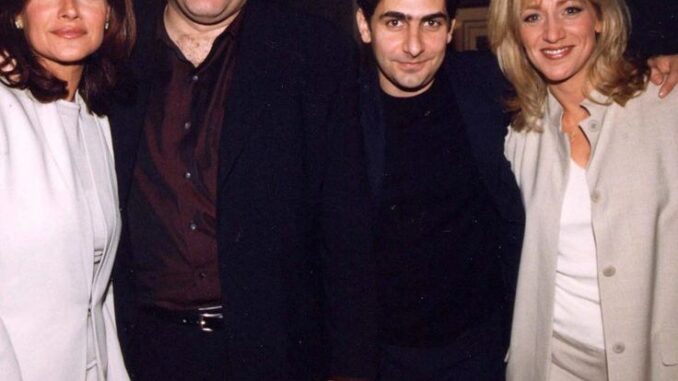
It’s been over a decade since The Sopranos aired its final episode, yet the groundbreaking mob drama continues to hold its place as one of the greatest television shows in history. From its unparalleled storytelling to its deep exploration of complex characters, The Sopranos has left an indelible mark on the entertainment world. As we reflect on its legacy, we realize that despite the passage of time, the show’s brilliance has not diminished one bit. Let’s dive into why, even ten years after its conclusion, The Sopranos remains the most masterful TV show ever.
The Impact of The Sopranos: A Game Changer for TV
When The Sopranos debuted in 1999, it did something no other show had done before—it blurred the lines between traditional drama and dark comedy, offering a unique narrative structure that changed TV forever. The show wasn’t just a mobster story; it was a deep psychological exploration of its characters, making viewers question their own perceptions of morality, loyalty, and power.
But what really made The Sopranos stand out? The combination of cinematic storytelling, brilliant writing, and a cast of unforgettable characters set it apart from anything that had come before.

Unmatched Storytelling: The Art of Subtlety and Depth
One of the main reasons The Sopranos still stands out is its sophisticated storytelling. Unlike many shows that lean heavily on action and plot twists, The Sopranos focused on quiet moments of introspection and complex character development. The show was known for its subtle approach, allowing audiences to immerse themselves in the intricacies of Tony Soprano’s life and mind.
By mixing family drama with the violent realities of organized crime, the show captured a world that felt both grounded in reality and extraordinary. Each episode explored themes like mental health, power dynamics, and betrayal, allowing viewers to peel back the layers of Tony’s psyche—his fears, anxieties, and, most importantly, his humanity.
The Legacy of Tony Soprano: TV’s Most Iconic Anti-Hero
When most people think of The Sopranos, they think of Tony Soprano. Played brilliantly by James Gandolfini, Tony is often regarded as one of the greatest TV characters of all time. A mob boss with a tender side, Tony’s journey was an exploration of power, self-doubt, and the complexities of leadership. His character blurred the lines between right and wrong, making him one of television’s most complex and unforgettable anti-heroes.
Tony’s vulnerability, particularly in his therapy sessions with Dr. Melfi, gave audiences an insight into the internal struggles of someone who outwardly appeared invincible. The juxtaposition of Tony’s ruthless persona and his moments of introspection created a powerful narrative that made him feel both terrifying and relatable.
The Sopranos’ Groundbreaking Use of Therapy: Breaking the Stigma
Speaking of Tony’s therapy sessions, they were one of the most innovative aspects of The Sopranos. In a world where therapy was often seen as a taboo topic in the 1990s, The Sopranos normalized the concept and made it a central theme of the show. Through these sessions, viewers saw Tony’s vulnerability and internal conflict, which played a huge role in making his character feel so authentic.
By using therapy as a window into the mob boss’s mind, the show broke new ground in how mental health was portrayed on television. It not only humanized Tony but also opened up a larger conversation about mental health, something that many shows still shy away from today.
The Supporting Cast: A Masterclass in Character Development
While Tony was the central focus of The Sopranos, the supporting cast was just as integral to the show’s success. Characters like Carmela, Christopher, Paulie, and Dr. Melfi were more than just secondary figures—they were fully realized individuals with their own arcs and struggles. Their complex relationships with Tony and each other added layers of richness to the story, making The Sopranos feel like a true ensemble piece.
Each character had their own moral compass, creating tension and conflict in every scene. Carmela, Tony’s wife, for example, was torn between her loyalty to her husband and her desire for a better life. Christopher, Tony’s nephew, struggled with his own identity as a member of the mafia while trying to achieve a career in Hollywood. These personal journeys provided some of the most compelling moments of the series.

The Sopranos’ Cinematic Approach: Elevating TV to New Heights
Another reason The Sopranos has endured as a masterpiece is its cinematic quality. David Chase, the show’s creator, brought a director’s eye to the series, making each episode feel like a carefully crafted film. From the haunting opening credits to the dark, moody shots of New Jersey’s suburban landscape, The Sopranos was visually stunning.
The show’s use of symbolism, lighting, and camera angles elevated it beyond the typical TV show. The famous dream sequences, in particular, showcased the show’s ability to combine surrealism with real-world themes, providing a deeper understanding of Tony’s inner turmoil.
The Controversial Finale: Still Leaving Fans Talking
One of the most talked-about aspects of The Sopranos is its final episode, which left viewers with a sense of ambiguity. The closing scene, where Tony sits down in a diner with his family, ended abruptly, leading many to question whether Tony was killed or whether life simply went on.
This open-ended conclusion sparked countless debates among fans, but it also cemented The Sopranos as a show that wasn’t afraid to challenge its audience. Instead of offering a neatly tied-up conclusion, The Sopranos gave viewers the freedom to interpret the ending however they saw fit, which is one of the reasons why the finale is still the subject of conversation today.
Enduring Influence on Modern TV
The Sopranos didn’t just change the landscape of television—it created a blueprint for the modern TV drama. Shows like Breaking Bad, Mad Men, and Better Call Saul owe a great deal to The Sopranos in terms of narrative complexity, character development, and the blending of genres.
Its influence on TV writing and production continues to be felt, with many of today’s most critically acclaimed series taking inspiration from the way The Sopranos mixed crime, family drama, and psychological exploration.
Why The Sopranos Is Still the Most Masterful Show Ever
So, what makes The Sopranos so timeless? It’s the way it tackled complex themes, its unforgettable characters, its refusal to play by conventional TV rules, and its ability to elevate the medium to new artistic heights. The show’s blend of dark humor, psychological depth, and gripping drama continues to make it relevant, even a decade after it ended.
In a world where television shows come and go, The Sopranos remains a true masterpiece—one that set the bar for all dramas that followed. If you haven’t watched it, now is the perfect time to revisit Tony Soprano’s world. If you have, you already know why it’s still the greatest.
Conclusion: A Timeless Classic in TV History
It’s been ten years since The Sopranos aired its final episode, but its legacy remains untouched. From its groundbreaking storytelling to its unforgettable characters, the show has left an indelible mark on television. While other shows may come and go, The Sopranos will forever hold its place as the most masterful TV show ever created.
Whether you’re a long-time fan or someone who has yet to dive into the world of Tony Soprano, there’s no denying the impact The Sopranos has had on the TV landscape. Ten years later, the show still stands as a testament to the power of great storytelling and unforgettable characters.
